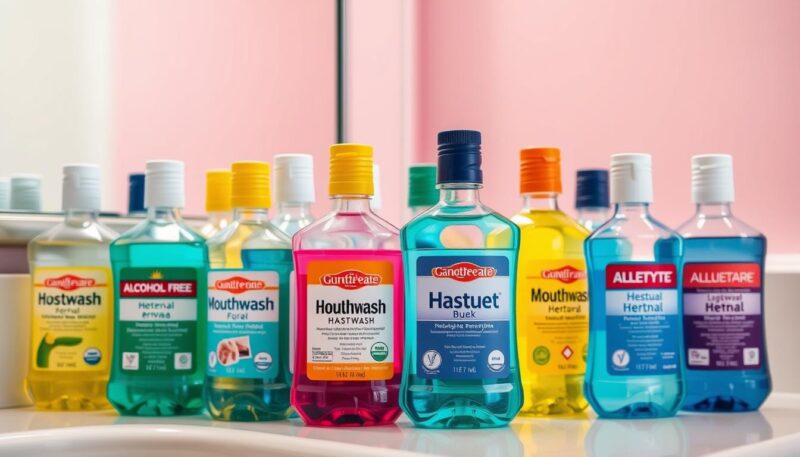When you use mouthwash, do you experience a burning sensation? You’re not alone. Many people wonder if mouthwash is supposed to burn, and the answer is not a simple yes or no. Mouthwash, also known as oral rinse, is a liquid-based dental hygiene product that cleans your mouth, freshens your breath, and kills bacteria on your tongue and between your teeth. If you’re experiencing a mouthwash burning sensation, it’s essential to understand the possible causes and how to choose the right mouthwash for your needs.
As you consider your oral health, it’s crucial to get dentist advice on mouthwash to ensure you’re using the right product for your mouth, tongue, and gums. With over 25 percent of mouthwash formulas containing alcohol as one of the active ingredients, it’s no wonder some people experience a burning sensation. The Food and Drug Administration (FDA) has also documented a rare severe allergy to chlorhexidine, an ingredient found in some mouthwashes.
Some individuals may be extremely sensitive to menthol, which is derived from mint or peppermint, and experience severe burning rather than a pleasant tingling sensation when using mouthwash. Not all mouthwashes cause a burning sensation, but individual sensitivity to different ingredients may make it challenging to find one that does not cause any burning symptoms. In this guide, we’ll explore the various types of mouthwash, their effects, and provide you with expert insights from a dentist’s perspective to help you make an informed decision about your oral health.
Understanding the Burning Sensation: Is Mouthwash Supposed to Burn?
When you use mouthwash, a burning sensation can sometimes occur. This feeling varies depending on the ingredients used in the product. It’s essential to know what causes this irritation to choose the right mouthwash for your needs.
Why Some Mouthwashes Cause a Burning Feeling
The primary causes of mouthwash irritation include alcohol and other active ingredients. Alcohol acts as an antiseptic, killing bacteria and sanitizing your mouth, but it can also be harsh on your oral tissues. Additionally, ingredients like menthol, chlorhexidine, and essential oils contribute to the burning sensation some users experience.
The Role of Alcohol in Mouthwash
Alcohol is a common component in many mouthwashes, with concentrations up to 25%. It enhances mouthwash effectiveness by eliminating a broad spectrum of bacteria. However, not all bacteria are eradicated by alcohol alone, necessitating the inclusion of other agents for comprehensive oral care.
Normal vs. Concerning Burning Sensations
A mild burning feeling is typically normal and indicates that the mouthwash is working. However, excessive discomfort may signal irritation or sensitivity to ingredients. If you experience severe burning, swelling, or allergic reactions, it might be time to explore alcohol-free mouthwash options.
| Mouthwash Type | Key Benefits | Potential Irritants |
|---|---|---|
| Antiseptic | Kills all bacteria, freshens breath | High alcohol content, chlorhexidine |
| Antibacterial | Targets specific bacteria, reduces gingivitis | Lower alcohol, essential oils |
| Fluoride | Strengthens enamel, prevents cavities | Minimal irritants |
| Alcohol-Free | Gentle on tissues, suitable for sensitive mouths | Possible reliance on other active ingredients |
Different Types of Mouthwash and Their Effects
Understanding the different types of mouthwash can help you choose the right one for your needs. Mouthwash plays a significant role in oral health by providing various benefits beyond brushing and flossing.
There are primarily two types of mouthwash: cosmetic and therapeutic. Mouthwash for fresh breath is typically cosmetic, offering temporary relief from bad odors and a pleasant taste.
Mouthwash and oral health are closely linked when using therapeutic mouthwashes. These contain active ingredients that help reduce plaque, gingivitis, and prevent tooth decay. Some therapeutic options also include fluoride to strengthen enamel and chlorhexidine to fight gum disease.
- Cosmetic Mouthwash: Provides temporary fresh breath and taste enhancement.
- Therapeutic Mouthwash: Targets oral health issues like plaque and gum inflammation.
- Alcohol-Free Mouthwash: Ideal for sensitive mouths, reducing the risk of burning sensations.
- Whitening Mouthwash: Helps remove stains and whiten teeth.
Specialized mouthwashes are also available for specific concerns, such as dry mouth or sensitive teeth. Selecting the appropriate type of mouthwash ensures you address your unique oral health needs effectively.

| Type of Mouthwash | Benefits | Common Ingredients |
|---|---|---|
| Cosmetic | Freshens breath temporarily, masks bad odors | Essential oils, alcohol |
| Therapeutic | Reduces plaque, gingivitis, and tooth decay | Fluoride, chlorhexidine |
| Alcohol-Free | Suitable for sensitive mouths, minimizes burning sensation | Cetylpyridinium chloride, essential oils |
| Whitening | Helps remove stains and whiten teeth | Hydrogen peroxide, baking soda |
Conclusion: Making the Right Choice for Your Oral Health
Choosing the right mouthwash is a crucial step in maintaining your oral health. If you experience a burning sensation, it might be due to ingredients like alcohol or menthol commonly found in many mouthwashes. Understanding these effects can help you make informed decisions.
There are numerous alternatives available that can provide the benefits you need without the discomfort. For instance, Crest offers a variety of mouthwashes tailored to different needs, such as Crest Gum Care for preventing gum disease or Crest 3D White for whitening your smile. These options often have lower alcohol content, reducing the chance of burning sensations.
It’s important to remember that mouthwash should complement your daily brushing and flossing routine, not replace it. Proper oral hygiene practices are essential for preventing issues like plaque buildup and bad breath. Additionally, consulting with your dentist can provide personalized advice on the best mouthwash for your specific needs.
When using mouthwash, follow the recommended guidelines: use about 20ml of rinse, gargle for around thirty seconds, and avoid rinsing with water immediately after. This ensures that the active ingredients can effectively protect your teeth and gums.
By making informed choices and seeking professional advice, you can enhance your oral care routine and achieve a healthier, more comfortable smile.

